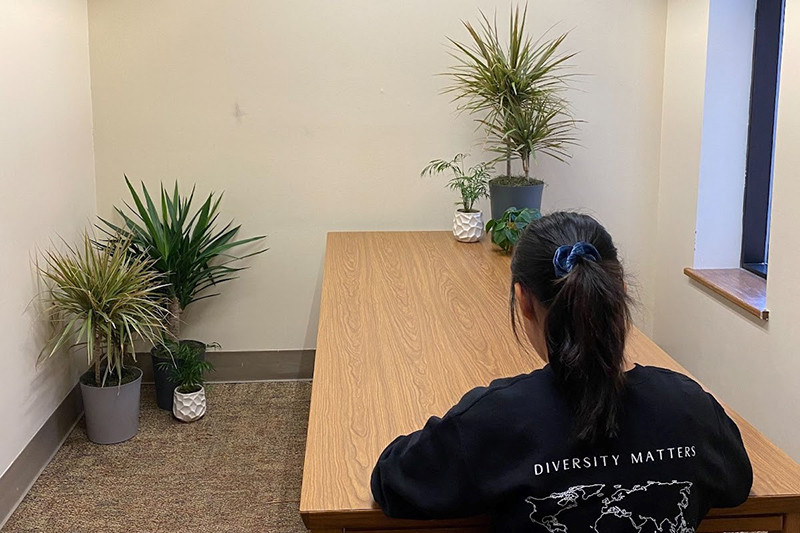- About
- Admissions
-
Academics
- Undergraduate Programs
- Pre-Major
-
Departments
- Overview
- Art Program
- Biblical Studies, Christian Ministries, Intercultural Studies & Philosophy Department
- Biology Program
- Business Department
- Chemistry Department
- Communication Department
- Computer Science & Engineering Department
- Education Department
- Engineering Program
- English Program
- Environmental Science & Sustainable Development Program
- Film & Media Program
- History, Global & Political Studies Department
- Kinesiology Department
- Mathematics Department
- Modern Languages Program
- Music Program
- Physics Program
- Psychology Department
- Social Work Program
- Sociology Program
- Theatre & Dance Program
- Liberal Arts
- Study Abroad
- Graduate Programs
- Online Programs & Licensures
- Special Programs
- Academic Enrichment Center
- Life at Taylor
Info For
Researching Restorative Spaces on Campus

At Taylor, students conducting hands-on research with tangible results is not just limited to STEM. The Psychology Department offers students opportunities to work at practicums off-campus and participate in research projects on-campus. Over the last two years, Psychology students have worked to research shared physical spaces on campus, their use, and students’ responsiveness to those spaces.
Application in Industrial-Organizational Psychology
Assistant Professor of Psychology Dr. Laura McClelland specializes in Industrial-Organizational Psychology, a field that studies the science of human behavior in the workplace. This area of psychology looks at encouraging efficiency and excellence throughout an organization, and part of that includes examining the spaces that people occupy. Factors such as lighting, noise level, temperature, color, and nearby objects can have a significant impact on the way people feel in a workplace, and therefore their productivity.
Students working with the research team are not only helping to make changes on campus, but they’re getting experience in a real-world field that helps prepare them for careers after college.
Understanding Campus Spaces
Luke Slater ’22 took a research class with McClelland and wanted to dive deeper into utilizing those research skills. McClelland knew that James Brads ’22 was also interested in starting a research team, and connected Brads and Slater. The team continued to grow and shift as students joined and graduated over the course of the research project.
The initial data collection began in the spring of 2021, where the team sent out a survey to the entire student body that measured various personality facets, one of which was introversion versus extroversion. Understanding where people gain their energy helped the team focus the topic of their research.
“When we interact with spaces and when we focus on given tasks, we use up mental resources, and it can be draining,” Slater said. “What we’re looking at is what types of spaces can help restore those resources, helping students be more effective at what they’re doing.”
Taylor is well known for having a strong, vibrant campus community, and buildings like the LaRita Boren Campus Center and Zondervan Library are designed for students to use as gathering places and areas to study. The team wanted to know just how useful and restorative students find these spaces.
“If we look around Taylor’s campus, there tends to be a focus on open spaces with lots of windows, seating areas, and a lot of it is focused towards communication and talking to other people, bringing people together,” Slater said. “The Student Center is a really good example of that. And these are great spaces. But our question was whether this accommodates the full spectrum of personality types here at Taylor, and so that’s where the focus began.”
From Research to Results
The team began conducting experiments, now with their research goal more specified. Students were asked to sit in study rooms in the Zondervan Library with different factors. The variables included control (no plants or mural), real plants, fake plants, and a large painted wall mural of a forest and waterscape.
Once in the rooms, the students waited without any stimuli for 5 minutes. Then, they began filling out various questionnaires. After a total of 20 minutes in the room, they rated the restorativeness (how they felt) of the space.
The research project is ongoing, and it coincides with a growing, campus-wide awareness of wanting to ensure that Taylor’s spaces are used well, and with student well-being in mind.
Back at Zondervan library, the team’s research data helped confirm what the library staff was also assessing. It was clear that students wanted quiet spaces that could be closed with a door, but were still close to other people.
“‘Alone but together’ is a phrase being used a lot in libraries right now,” said Shannon Eaves, director of Zondervan Library. “Students want quiet places that can be closed with a door, but are still close to the action, close to others. They want quiet, not isolation.”
Eaves secured grant funding to install two individual study pods on the main level. These tiny stalls are complete with noise-canceling walls, electrical outlets, and a stool with an adjustable footrest. They are in frequent use, especially for job interviews or other Zoom meetings.
“The Library is the only place that offers genuinely quiet study space,” said Eaves. “My team is constantly assessing our building and working on ways we can maximize the use of our space, in order to better serve our community.”
Restorative Study Matters at Taylor
At Taylor, student work takes center stage. From research to writing, and everything in between, getting involved with your field of study can make an impact.
The Psychology department offers students a strong foundation on which to build a wide variety of careers. If you’re interested in learning more about the Psychology Department, schedule your campus visit today.

